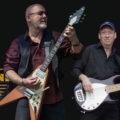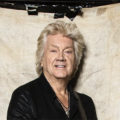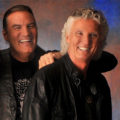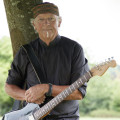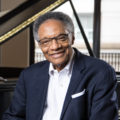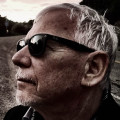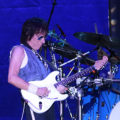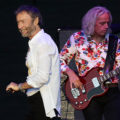Jefferson Airplane originator Jorma Kaukonen resumes quarantine concerts, unplugs Hot Tuna
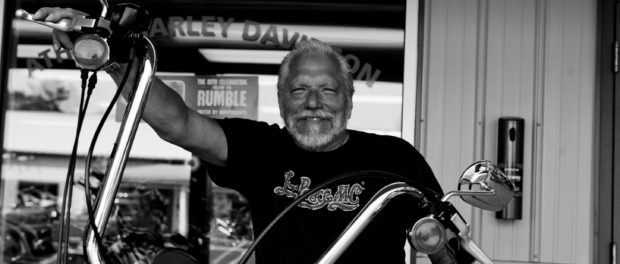 Photo provided by Scotty Hall
Photo provided by Scotty Hall
Rock and Roll Hall of Famer Jorma Kaukonen first took flight at the start of San Francisco’s Jefferson Airplane, laying down lead guitar on the Grace Slick-belted classics “Somebody To Love,” “White Rabbit” and “Volunteers,” alongside otherworldly instrumentals such as “Embryonic Journey” that defined the Woodstock generation.
Despite stepping away from the psychedelic pioneers just as some other members boarded the Starship, he and fellow Airplane alum/bassist Jack Casady have been cooking up a half-century helping of Americana and blues-based Hot Tuna in both electric and acoustic environments.
Given the global shutdown of most shows, the pair of lifelong pals have shifted their focus towards resuming a series of Saturday night quarantine concerts, which Kaukonen kicked off solo at the start of the pandemic, intermingled with a string of archival broadcasts.
Chicago Concert Reviews spoke with the legendary player via phone from Fur Peace Ranch, his musical, multi-media and educational oasis in Ohio, for a bunch about both bands, writing the memoir, “Been So Long: My Life And Music,” and winding up with a Grammy Lifetime Achievement Award.
What made you instantly dive into online concerts as venues were closing rather than taking a break or waiting to see when shows with audiences might resume?
 Jorma Kaukonen: It was actually a no brainer for us because down at our Fur Peace Ranch here in southeast Ohio, we have a 200-seat theatre that we’ve had for almost 20 years. We’ve also been doing shows for our local public radio station for almost that entire time, so we actually have a room, a production facility and all the video stuff…We got to thinking about the fact that we’re all stuck here. “Wow, look, we’ve got a room, we’ve got the gear, we have the internet hook-up, we have a YouTube channel, and we have a videographer, and people to help us do this, so it’s really a no brainer.
Jorma Kaukonen: It was actually a no brainer for us because down at our Fur Peace Ranch here in southeast Ohio, we have a 200-seat theatre that we’ve had for almost 20 years. We’ve also been doing shows for our local public radio station for almost that entire time, so we actually have a room, a production facility and all the video stuff…We got to thinking about the fact that we’re all stuck here. “Wow, look, we’ve got a room, we’ve got the gear, we have the internet hook-up, we have a YouTube channel, and we have a videographer, and people to help us do this, so it’s really a no brainer.
In the beginning, you never know how things are going to evolve. Everything is totally organic in my life. The more it went, I could see it more than just focusing on the stuff that I do. We’ve been doing some small classes and we’ve had guest artists. My wife and I yak at each other and try our best to embarrass each other on air. We’re just having a great time with it and it’s evolving.
The series switched from current live content to rare archival material for several weeks. What did digging back mean to you personally?
Kaukonen: That was one of the hidden blessings. As a guy that’s been on the road all my life, when Jack and I play together or when I play solo, you go to the well of things that are active in your repertoire at any given moment. When we were working all the time, I would never take the time and go back and look at things that I hadn’t played in years that might actually take some work, not that I was being inherently lazy, but it just wouldn’t have occurred to me. In the beginning, there were a number of times when I didn’t duplicate songs. Obviously, we’re starting to duplicate songs now, but I went through all my stuff and realized I had over a 100 songs that I could call upon if I could remember how to do them all, so I went back to the well with things I hadn’t played in years.
I’m actually practicing guitar in a way I hadn’t done in decades and that was fun because I love the guitar. It’s never not exciting for me. Doing gigs is playing, it’s not practicing. Sometimes you just take the path of least resistance and this time I had the time to take a path that was a little more complex. It’s really fun because you go back to something you haven’t played in decades, and yes there’s some muscle memory, but you can’t count on that.
One of the things that’s incredibly humorous to me is my vocals were nowhere near as clear as they are today and I don’t have notes for some of those lyrics. But fortunately, thanks to the internet, there’s people out there who’ve been getting under my musical skin forever and I’ve had a chance to poll people. “What am I saying here?” Then I go back and figure out what I’ve really been saying, so that’s been hilarious. Taking the time to practice and relearn old stuff has actually been very exciting.
 What’s coming up as you shift gears towards fresh performances again as the acoustic version of Hot Tuna with Jack?
What’s coming up as you shift gears towards fresh performances again as the acoustic version of Hot Tuna with Jack?
Kaukonen: Jack drove up from California. We’ve been doing shows here at the ranch…Jack’s my oldest buddy, both musically and personally. The fact that we haven’t been sort of like in each other’s face all the time on the road, we’ve brought some fresh insights back into the music. I don’t want to spoil things, but this coming weekend [with guest Larry Campbell], we’ve dug a few old [but] new things out. Now we’re together when I’m here in town and we’re gonna be working on some old stuff. It’s a good time, it really is.
While we’re on the subject of concerts, do any memories of Chicago jump out at you?
Kaukonen: I saw that movie about “The Trial Of The Chicago 7” and I remember a lot of that stuff took place was in Lincoln Park. I remember the Airplane had played a number of shows in Lincoln Park. I live in a very rural area, but New York and Chicago in a lot of ways are really like home places to me. I’ve played so many places in Chicago. A couple weeks ago, I did an online workshop for the Old Town School Of Folk Music and I have another one coming up.
Also, Chicago is in my opinion the home of electric blues. I’ve gotten to be good friends with one of your guys, Dave Specter. I got to play on his album, [“Blues…From The Inside Out”], last year. We did so many [shows at] Park West, Biddy Mulligan’s and we spent two weeks playing Mother Blues when Signe [Toly Anderson], our first chick singer, was still in the band. There are milestones in my musical life that involve Chicago and that school. I can’t wait to get back there in person so we can actually look at each other and say “hey, how are you?”
Another city we need to talk about in San Francisco. What was it like when Jefferson Airplane was taking off?
Kaukonen: There was just a perfect storm of synchronicity. We all moved to San Francisco because it had this cache of being cool, which it was, and it was a cheap place to live, which today is an unbelievable thought. When I moved there in ‘62, the whole Bay Area folk music scene was so inviting…Then it became apparent “wow, rock & roll, that looks like fun. I can plug in. I can play standing up!” When that happened, a lot of that social invitational nest was everywhere.
The bands we think about, like the [Grateful] Dead, or the Airplane, or Big Brother And The Holding Company, and a lot of the other bands that have been gone for a long time, nobody really worked a lot back in those days, so there was a lot of hanging out and a lot of cross-pollination. The scene on the street before the so called “Summer Of Love” kind of screwed everything up was unbelievable because San Francisco was a small town back then and you just knew everybody. It was kind of like hanging out with your buddies, whatever your specialty was, so the magic at that time as it began to grow and the rest of the nation became aware of it is hard to describe. It was just incredibly loveable for lack of a better word. I think what happened when a lot of the bands like us, or Big Brother, or The Dead, because those are the ones that popped to the surface immediately, when our “careers” started to take off, there was less time for that hanging out. But in the early days, it was a great social scene and incredibly creative.
 The group played at every 1960s festival imaginable, including Altamont, Monterey Pop and Woodstock. How do you remember the vibe in general?
The group played at every 1960s festival imaginable, including Altamont, Monterey Pop and Woodstock. How do you remember the vibe in general?
Kaukonen: Before the commercial festivals around the country took off, a lot of the bands of San Francisco would set up in the park and sort of have an impromptu festival. I have no facts to base this on, but I believe that promoters at some point looked around and saw some of the things that were happening in San Francisco when any one of the local bands would show up in the park, bring a flatbed truck, a little PA and set up. A lot of people showed up and they thought “you know, we could do this commercially,” so the whole festival thing started to take off…[There was a] sense of ‘60s community that we all looked back fondly with sort of euphoric recall of like-minded spirits getting together in large numbers to listen to their bands. It just seemed like the right thing to do. Of course, festivals were always fun.
People always ask about Woodstock, and of course Woodstock is one of the most iconic festivals. That being said, looking back on it in terms of what we’ve come to take for granted today- I wasn’t in the crowd, I was backstage of course- there were like zero amenities. People go “what was on the rider?” Nobody had a rider in those days! You just went to the gig. There was no issue with the brown M&M’s because there wouldn’t have been any M&M’s. With an outdoor festival like Woodstock, if you have a moderately clean Porta-Potty, that was good thing.
How did all of that enormous fame that came with the territory sit with you?
Kaukonen: That’s an interesting question and can be a conversation by itself. I think a lot of that has to do with at some point we were growing up. I considered myself a moderate and likeable guy, and that may not have been the case. We’ll have to poll people that knew me back then, but when stuff started happening with the Airplane very quickly, we were unbelievably lucky. Within months of the band getting together, we had a record deal with RCA. That kind of stuff back then was unheard of. We went from being nobody, or local kids more or less, to being somebody on a national level, and ultimately, on an international level. That’s a lot of weight to carry. It’s hard to put myself in that position. Looking back, you almost think of it as your right. “I deserve to be here.” Then many years later, you look back saying “what a stupid think to think” [laughs].
When your band is new with your freshman or sophomore outing, everything is still new so it’s exciting. To be able to maintain that level of creativity is very tough and I think when that reality set in for me, because I’m not a prolific writer, that brought me back to earth. The Airplane started a very long train moving for me, and in some ways the train’s still rolling. We probably wouldn’t be talking about my acoustic guitar stuff and probably many people wouldn’t have heard it had it not been for Jefferson Airplane. All that stuff works hand in hand. Unless you’re very mature at a young age, I think that success is tough to handle. But if you’re lucky, you survive it and get over it.
What was it like to transition away from the Airplane towards Hot Tuna?
 Kaukonen: I started out as an acoustic player. I never played electric guitar really before the Airplane and I never quit doing it. Jack and I had a backlog from spending so much time together on the road and playing the stuff that became the first Hot Tuna record, as the Airplane was becoming more distant. When the Airplane got together, we were so focused on what we did. We rehearsed nine, ten hours a day. We did nothing else but play and rehearse. When you get older, and after a while, it’s hard to maintain that kind of focus.
Kaukonen: I started out as an acoustic player. I never played electric guitar really before the Airplane and I never quit doing it. Jack and I had a backlog from spending so much time together on the road and playing the stuff that became the first Hot Tuna record, as the Airplane was becoming more distant. When the Airplane got together, we were so focused on what we did. We rehearsed nine, ten hours a day. We did nothing else but play and rehearse. When you get older, and after a while, it’s hard to maintain that kind of focus.
When that first personal band family thing began to dissipate a little bit, the Airplane was no longer as much fun for me, which is probably one of the reasons why I left. But I took so much of the stuff that I learned. I owe all those guys and girls in the Airplane such a debt of gratitude. I got to learn on the job. I learned how to play electric guitar with a band and I began to get a vision of what I would do if I had my own band and that sort of split into what Hot Tuna became, both acoustically and electrically.
What are the primary works you feel best represent each aspect?
Kaukonen: Well, first of all, I think we have to start with the first [self-titled] acoustic album [recorded] live in New Orleans. There are so many sub phases as Hot Tuna moved into the ‘70s, but I think one of my favorite Hot Tuna records was “Burgers,” our first electric studio album because it’s such an eclectic little album. We had Papa John Creach there and we had a bunch of my folkie friends playing on the songs…
The whole story of both bands and beyond is in your book “Been So Long: My Life And Music,” which was just released in paperback. What have readers been saying?
Kaukonen: About 10 or 12 years ago, I got an offer to write a book and the company, who shall remain nameless, wanted somebody to co-write it with me. When I got into it, they were interested in me telling compromising stories about people that were more famous than myself, and that wasn’t interesting to me, so I said “forget about it.” St. Martin’s Press came to me with an offer and they just let me tell my story and I really enjoyed doing that…I told the story the best I could and I got a lot of really great feedback. I wound up making a lot of friends. People go “wow, I feel like I know you” and I go “well, I wrote the book. That’s pretty much who I am.” So I have nothing but positive things to say about what that brought to me.
What did you learn about yourself throughout the writing process?
Kaukonen: I learned to not be self-conscious about myself in any way. In a normal world, I’d be a great grandfather, but in this world, I’ve got a 14-year-old daughter and who knows what goes through her mind, you know? In the era that I grew up, there were so many constraints on not really showing who you were. I was born in 1940. Those were the war years and all that sort of bologna. I learned to not be self-conscious about who I thought I was and just to be happy with who I really am.
By sheer coincidence, Jefferson Starship just released a new album, “Mother Of The Sun.” What’s your opinion of it or simply the band going on after you left?
 Kaukonen: I haven’t heard it yet, but I did see that they just did that. When Jack and I quit the Airplane, and the guys and gals went on and did the Starship, my gag about this is I always quit the band before we make the real money because the Starship was a huge ‘80s hit maker. But time marches on, it’s true. Paul [Kantner] passed away, Marty [Balin] passed away, Grace [Slick] doesn’t sing anymore and people ask “what do you think about Starship?” I go “look, I know a lot of those people, some of those people pretty well. They put a lot of time into that band. Why shouldn’t they go on?” Gosh, you spend your life playing music. Why should you stop playing music? I haven’t heard their new record, so I can’t comment on that, but more power to ‘em.
Kaukonen: I haven’t heard it yet, but I did see that they just did that. When Jack and I quit the Airplane, and the guys and gals went on and did the Starship, my gag about this is I always quit the band before we make the real money because the Starship was a huge ‘80s hit maker. But time marches on, it’s true. Paul [Kantner] passed away, Marty [Balin] passed away, Grace [Slick] doesn’t sing anymore and people ask “what do you think about Starship?” I go “look, I know a lot of those people, some of those people pretty well. They put a lot of time into that band. Why shouldn’t they go on?” Gosh, you spend your life playing music. Why should you stop playing music? I haven’t heard their new record, so I can’t comment on that, but more power to ‘em.
You’re in the Rock and Roll Hall of Fame with the Airplane and the band was also recently given the Grammy Lifetime Achievement Award. What type of fulfillment do you find in those awards or are they secondary to your artistry?
Kaukonen: That’s a good question because obviously we didn’t get in this game for those kind of accolades. But I wouldn’t disrespect them cause when your peers honor you in some way, it is a real honor. I didn’t get in the music or the art game or whatever for awards, but when you get them, it just makes you feel good. If my parents were still alive, it would really make them happy because when we started out back in the day, I remember my dad said “well son, what are you gonna do when the bubble bursts?” When Jefferson Airplane got on the cover of Life Magazine, he got it. If we got a Grammy Lifetime Achievement Award, he would get that too and that would be cool.
Give us a glimpse of what life looks like now at the Fur Peace Ranch and how your interest in educating other budding artists came about.
Kaukonen: A lot of that has to do with Vanessa, my wife, because she always says I promise everything and she gets things done. I’ve taught off and on since before Jefferson Airplane, so I’ve always enjoyed that aspect of it. We lucked into 126 beautiful acres in southeastern Ohio 30 years ago and that’s what we decided what we wanted to do. I don’t run the business. My wife does that because there’s a lot of stuff I wouldn’t know how to do.
[Teaching allows me to] go back to the music that called out to me when I was young, which is essentially American folk music of very different kinds. That’s always been a very sociable kind of a musical conversation and we have a lot of great instructors besides myself. We just had a workshop that finished up yesterday. With the pandemic, we only have five students in each class with Jack and myself. To be able to share some of the stuff with a like-minded musical spirit that I’ve spent my life learning [alongside] is really gratifying, and when somebody gets it and that lightbulb goes off, it’s really gratifying.
For additional information on Jorma Kaukonen and Hot Tuna, visit JormaKaukonen.com and HotTuna.com.

